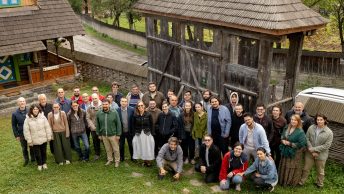Educație, distributism și egalitarism
Unul dintre cele mai atractive argumente promovate în favoarea existenței/menținerii unui învățământ finanțat/subvenționat de stat este acela de a asigura celor săraci accesul la educație.
Argumentele în favoarea finanțării educației de către stat sunt sintetizate pe scurt de Armen Alchian (primul argument se referă la accesul la educație al celor săraci, al doilea la stat ca agent care știe mai bine ce este bun pentru supuși, iar al treilea este o variantă a argumentul efectelor externe sau de vecinătate):
ADVOCATES OF subsidization of college students (regardless of the method) assume that if each student bore the full cost there would be too little college education as well as a decrease of educational opportunity. What makes it desirable to have more education than if students pay full costs? Several arguments are advanced. Let us discuss these in ascending order of sophistication.
(1) “Although the costs of education are less than the gains to the students themselves, some are unable to finance their education now. A subsidy would provide educational opportunity to the poor.” (2) “Cultural education, though not profitable in market earnings, and hence not capable of being paid for out of enhanced earnings, is nevertheless desirable.” (3) “Even if every student acquires as much education as is worthwhile to him, he would take too little, because the individual ignores the beneficial social gains indirectly conferred on other members of society—giving what some people call ‘external social effects.’ Therefore, society at large should induce students to take more education than indicated by their private interests.”
(Armen Alchian, The Economic and Social Impact of Free Tuition, New Individualist Review, editor Ralph Raico, Liberty Fund, 1981)
În legătură cu primul argument în favoarea subvențiilor – subvenții pentru a asigura accesul la educație al celor „săraci” – Armen Alchian observa că de facto despre nici o persoană tânără nu se poate spune că este „săracă” (în termeni monetari sau non-monetari), bazându-se pe în argumentul său pe: (a) diferența dintre bogăție și venit; (b) diferența dintre venit curent/ venituri viitoare și (c) pe recunoașterea că și capitalul uman este o formă de bogăție:
The argument that the poor can not afford to pay for a profitable college education is deceptive. What is meant by a “poor” person? Is he a college calibre student? All college calibre students are rich in both a monetary and non-monetary sense. Their inherited superior mental talent—human capital—is great wealth.
Failure to perceive this inherent wealth of college calibre students reflects ignorance of two economic facts. One is the enormous human wealth in our society. Every good educator recognizes that inanimate capital goods are not the only forms of wealth. The second fact is the difference between current earnings and wealth. For example, a man with a million dollars worth of growing trees, or untapped oil is a rich man—though he is not now marketing any of his wealth or services. So it is with the college calibre student. Though his current market earnings are small, his wealth—the present wealth value of his future earnings—is larger than for the average person. This is true no matter what the current earnings or wealth of his parents. It is wealth, not current earnings nor parent’s wealth, that is the measure of a student’s richness. College calibre students with low current earnings are not poor. Subsidized higher education, whether by zero tuition, scholarships, or zero interest loans, grants the college student a second windfall—a subsidy to exploit his initial windfall inheritance of talent. This is equivalent to subsidizing drilling costs for owners of oil-bearing lands in Texas.
(Armen Alchian, The Economic and Social Impact of Free Tuition, New Individualist Review, editor Ralph Raico, Liberty Fund, 1981)
O întrebare cât se poate de justificată este de ce aceia care beneficiază acum de educație să nu își plătească mai târziu studiile din veniturile viitoare?
Nothing in the provision of full educational opportunity implies that students who are financed during college should not later repay out of their enhanced earnings those who financed that education. Not to ask for repayment is to grant students a gift of wealth at the expense of those who do not attend college or who attend tuition colleges and pay for themselves.
(Armen Alchian, The Economic and Social Impact of Free Tuition, New Individualist Review, editor Ralph Raico, Liberty Fund, 1981)
Ideea asigurării accesului la educație pentru cei „săraci” prin învățământul de masă subvenționat/finanțat de stat presupune implicit o filosofie distributivistă. Problema este că acest sistem distributivist nu poate fi justificat prin necesitatea asigurării accesului tuturor la educație atâta vreme cât este și conceptibil și cât se poate de firesc ca accesul la educație să se facă printr-un sistem de credite sau asigurări prin care costul studiilor să fie suportat chiar de personale care beneficiază de acestea.
When some zero tuition university alumni say that without zero tuition they could not have attended college, they should have a modest concern for the implications of that statement. One poor, “uneducated” resident of Watts, upon hearing Ralph Bunche say that he could not have had a college education unless tuition were free, opined, “Perhaps it’s time he repay out of his higher income for that privilege granted him by taxes on us Negroes who never went to college.” That reply spots the difference between educational opportunity and a redistribution of wealth.
(Armen Alchian, The Economic and Social Impact of Free Tuition, New Individualist Review, editor Ralph Raico, Liberty Fund, 1981)
Problema este prin urmare de a alege între un sistem distributivist și unul non-distributivist. Ceea ce înseamnă că discuția se mută, în fond, pe un alt palier, dar totuși nu e lipsită de consecințe pentru problema educației, dacă ne gândim cel puțin la ineficiența sistemelor birocratice și la relația creată între educator și educat în contextul învățământului obligatoriu unde fiecare „beneficiar” își ia partea sa standardizată de „educație”. Relația educator-educat se desfășoară mult mai firesc pe baze voluntare, contractuale, relevând clar interesul celui care „cumpără” serviciile profesorilor pentru un anumit tip de educație și creând bazele unei concordanțe reale între conținutul educației și cerințele reale ale pieței muncii.
Uneori cazul educației subvenționate/finanțate de stat este susținut pe baza argumentului efectelor externe (pozitive) și sună în felul următor: fiecare individ va avea tendința să sub-investească în educație (din punct de vedere al „beneficiului social”) și deci „beneficul social net” într-un sistem cu subvenții ar fi mai mare decât într-unul fără subvenții. De exemplu, se spune, pe baza subvențiilor se vor califica mai mulți ingineri ceea ce înseamnă că „beneficiul social net” va fi mai mare. O scurtă analiză economică a problemei ne poate lămuri că nu rezultă nici un „beneficiu social” de aici (presupunând de dragul argumentului că beneficul social poate fi calculat) ci doar un alt tip de distribuție a averilor:
Engineers, looking only to their private gain would, it is said, undervalue the total benefit of having more engineers; too few people would seek sufficient engineering education. If this sounds persuasive, economics can teach you something. The increased supply of engineers reduces the prices of engineering services—even if by only a trivial amount—and thereby reduces the income of other engineers. Their income loss is the gain to the rest of society. This is a transfer of income from existing engineers to non-engineers; it is not a net social gain. The benefited parties gain at the expense of existing members of the engineering profession, who lose some of their scarcity value as more educated people are created. This is a transfer from the more educated to the less educated. A striking awareness of this effect is evident in the advocacy by labor groups of immigration restriction. Restricting the inflow of laborers of particular skills prevents reductions in wages of incumbent workers with similar skills and prevents a transfer of wealth from them to the rest of American society. An immigrant or a more educated person would have provided an increased product and he would have obtained that value by the sale of his services, but the lower wages to that type of services would have transferred some of the incomes of similar workers to the rest of society. This external transfer effect is not a net contribution to social output. It is not a reason for subsidizing education.
(Armen Alchian, The Economic and Social Impact of Free Tuition, New Individualist Review, editor Ralph Raico, Liberty Fund, 1981.)
Principial vorbind, este destul de limpede că ideea aceasta a subvenționării sau finanțării de către stat a educației apare în contextul acceptării unui regim distributivist și al ideii interconectate cu acesta – ideea egalizării șanselor aproape în orice sferă a vieții – ignorând, după cum am văzut, până și tranșarea problemei pe baza unei minimei raționalități economice. Rezultatul este imixtiunea nejustificată a legislației și politicului în toate aspectele vieții susceptibile că ar implica diferențe privind egalitatea șanselor, imixtiune susținută de toți cei care au de câștigat de pe urma schemelor distributiviste.
With the new socialist-liberal government the idea of equalizing opportunity came to the ideological forefront. And as has been predicted theoretically, it was in particular the official spreading of the idea mehr Demokratie wagen ("risk more Democracy")–initially one of the most popular slogans of the new (Willy Brandt) era-that led to a degree of politicalization unheard of before. All sorts of demands were raised in the name of equality of opportunity; and there was hardly any sphere of life, from childhood to old age, from leisure to work conditions, that was not examined intensely for possible differences that it offered to different people with regard to opportunities defined as relevant. Not surprisingly, such opportunities and such differences were found constantly, and, accordingly, the realm of politics seemed to expand almost daily.
…a process of politicalization will be sustained mainly by those who can profit from its distributional schemes and that the job of defining opportunities is essentially arbitrary and a matter of rhetorical power, then made it one of its central concerns to channel the most diverse political energies set in motion into the field of equalizing, above all, educational opportunities.
(Hans Hermann Hoppe, A Theory of Socialism and Capitalism, Kluwer Academic Publishers, 1989, pp.62-63)
Despre falsa idee că statul sau experții din agențiile de stat pot ști mai bine care este adevăratul interes al oamenilor și mai ales că îl și vor promova:
Finally, the proponents of government intervention are trapped in a fatal contradiction: they assume that individuals are not competent to run their own affairs or to hire experts to advise them. And yet they also assume that these same individuals are equipped to vote for these same experts at the ballot box. We have seen that, on the contrary, while most people have a direct idea and a direct test of their own personal interests on the market, they cannot understand the complex chains of praxeological and philosophical reasoning necessary for a choice of rulers or political policies. Yet this political sphere of open demagogy is precisely the only one where the mass of individuals are deemed to be competent.
(Murray Rothbard, Man Economy and State and Power and Market¸ Luwig von Mises Institute, 2004, p. 1302)
But what if the consumers are mistaken with regard to their own interests? Obviously, they sometimes are. But several more points must be made. In the first place, every individual knows the data of his own inner self best—by the very fact that each has a separate mind and ego. Secondly, the individual, if in doubt about what his own true interests are, is free to hire and consult experts to give him advice based on their superior knowledge. The individual hires these experts and, on the market, can continuously test their helpfulness. Individuals on the market, in short, tend to patronize those experts whose advice proves most successful. Good doctors or lawyers reap rewards on the free market, while poor ones fail. But when government intervenes, the government expert acquires his revenue by compulsory levy. There is no market test of his success in teaching people their true interests. The only test is his success in acquiring the political support of the State’s machinery of coercion.
It is curious that people tend to regard government as a quasi-divine, selfless, Santa Claus organization. Government was constructed neither for ability nor for the exercise of loving care; government was built for the use of force and for necessarily demagogic appeals for votes. If individuals do not know their own interests in many cases, they are free to turn to private experts for guidance. It is absurd to say that they will be served better by a coercive, demagogic apparatus.
(Murray Rothbard, Man Economy and State and Power and Market¸ Luwig von Mises Institute, 2004, pp. 1301-1302)
Idealul acesta al egalitarismului, chiar și în această variantă a egalității șanselor are la bază o filosofie a “revoltei împotriva naturii” și în esența sa nu este un ideal mai puțin socialist decât idealul egalizării brute și al uniformizării. Orice alegere înseamnă totodată și o renunțare, iar prin dinamica aceasta a alegerilor și a renunțărilor fiecare persoană se plasează diferit (deci inegal) în raport cu diverse scopuri și în final ajunge să aibă șanse diferite. Idealul egalității șanselor ca și idealul egalizării brute și al uniformizării are la bază aceeași filosofie a negării oricărei strucuri a realității, acțiunii și naturii umane și se reclamă ca un ideal utopic, irealizabil, dar pe care îl asumă în genere toate teoriile ingineriei sociale de tip socialist sau democrat.
At the heart of the egalitarian left is the pathological belief that there is no structure of reality; that all the world is a tabula rasa that can be changed at any moment in any desired direction by the mere exercise of human will – in short, that reality can be instantly transformed by the mere wish or whim of human beings…
…each person in the communist utopia would fully develop all of his powers in every direction. As Engels wrote in his Anti-Dühring, communism would give "each individual the opportunity to develop and exercise all his faculties, physical and mental, in all directions." And Lenin looked forward in 1920 to the "abolition of the division of labor among people…the education, schooling, and training of people with an all-around development and an all-around training, people able to do everything. Communism is marching and must march toward this goal, and will reach it."
In his trenchant critique of the communist vision, Alexander Gray charges:
That each individual should have the opportunity of developing all his faculties, physical and mental, in all directions, is a dream which will cheer the vision only of the simple-minded, oblivious of the restrictions imposed by the narrow limits of human life. For life is a series of acts of choice, and each choice is at the same time a renunciation.
Even the inhabitant of Engels’s future fairyland will have to decide sooner or later whether he wishes to be Archbishop of Canterbury or First Sea Lord, whether he should seek to excel as a violinist or as a pugilist, whether he should elect to know all about Chinese literature or about the hidden pages in the life of a mackerel.
(Murray Rothbard, Egalitarianism as a Revolt Against Nature, în Egalitarianism as a Revolt Against Nature and other Essays, Ludwig von Mises Institute, 2000, pp. 18-19)
Vezi și:




